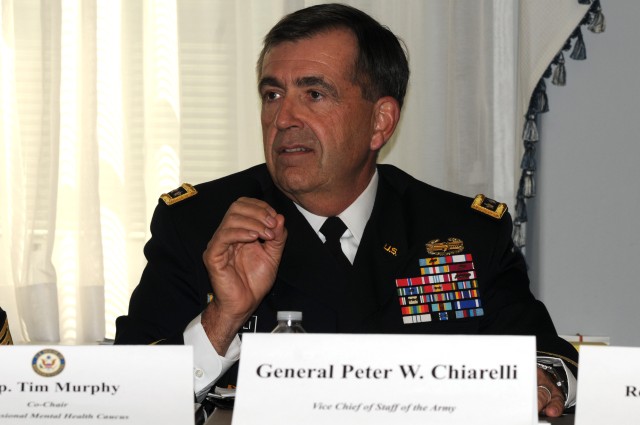WASHINGTON (Army News Service, May 13, 2011) -- A medical test in the works, though possibly still years away, could show Army medics in just a few hours if a Soldier has suffered from concussion.
The test, something similar to what diabetics must do for testing blood sugar, is being researched by the Army's Medical Research and Materiel Command.
The test could eventually tell an Army medic "within 95 percent certainty ... whether the individual has a concussion," said Vice Chief of Staff of the Army Gen. Peter Chiarelli. "That is huge for us, because there will be no more guessing about whether the individual suffered a concision. We will no longer have to use the (Military Acute Concussion Evaluation) test, we'll be able to tell if they have a concussion and be able to treat them for that concussion immediately."
The test will look for hyperphosphorylated tau protein, something not found in great quantities in a normal brain,but which has been shown to collect in the brains of those who have suffered repeated blows to the head -- including boxers and Soldiers, according to research done by Dr. Ann McKee, a neural pathologist from Boston University.
Chiarelli appeared on Capitol Hill May 12 as part of panel discussion on mental health issues, where he also discussed the Army's effort to eliminate any embarrassment Soldiers may feel, or any fear they may have about affects on their jobs, from seeking help for mental health issues -- such as those related to post traumatic stress.
The general said today, more than 8,400 Soldiers are part of the Army's Wounded Warrior program, and that 65 percent of those have traumatic brain injury or post traumatic stress. About 11 percent suffer from loss of limb.
So much of effort is focused on that 11 percent, he said, "we have forgotten in many instances the 65 percent." He said he expects there are more in the Army that suffer from either TBI, PTS or both, because many sufferers are ashamed to seek help. "That's the real elephant in the room -- stigma," he said
The general also said the Army, like the larger American society, is suffering from a shortage of behavioral health specialists, and that it is in fact a "national crisis." Efforts in tele-behavioral health -- allowing specialists to meet with patients through teleconferencing technology, for instance -- could increase the effectiveness and reach of a limited number of providers. But the general said there are challenges regarding the credentialing and licensing of specialists to work across state lines.


Social Sharing